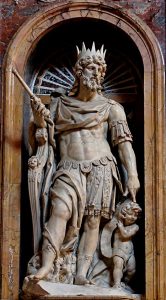The book of Daniel has many symbolic visions, and even though they are strange, some of them are very important for describing the coming of Jesus and his kingdom. One of the most important passages is in Daniel 7:13-14:
In my vision at night I looked, and there before me was one like a son of man, coming with the clouds of heaven. He approached the Ancient of Days and was led into his presence. He was given authority, glory and sovereign power; all peoples, nations and men of every language worshiped him. His dominion is an everlasting dominion that will not pass away, and his kingdom is one that will never be destroyed.
 This passage is about the Messianic king. God had promised David that one of his own offspring would have a kingdom without end (2 Sam 7:13), and this is who is being described here. Daniel has visions of many kingdoms rising to power, but the final kingdom that conquers them all is this kingdom of the Messiah. This is the scene of the the great King coming to take his seat of honor and receive authority over all creation.
This passage is about the Messianic king. God had promised David that one of his own offspring would have a kingdom without end (2 Sam 7:13), and this is who is being described here. Daniel has visions of many kingdoms rising to power, but the final kingdom that conquers them all is this kingdom of the Messiah. This is the scene of the the great King coming to take his seat of honor and receive authority over all creation.
The most significant part of this passage is the description of the Messiah as “one like a son of man.” The term “son of man” is often used poetically in the Old Testament to refer to a human being. Often, it emphasizes that the human being is merely mortal and not divine, like in Psalm 8:
O LORD, our Lord, how majestic is your name in all the earth! You have set your glory above the heavens… what is man that you are mindful of him, the son of man that you care for him? (Psalm 8:1, 4)
Many Christians have assumed that when Jesus uses the phrase to describe himself, he is emphasizing his humanity. That appears to be true in some places. However, people are often unaware that the phrase “Son of Man” was one of the most powerful Messianic claims, because of this passage in Daniel that describes the incredible glory that is given to this particular “Son of Man,” who is also the Son of David who is the Messianic King.
When we now look closer at how Jesus uses the phrase “Son of Man” to refer to himself, we can see that he is often referring to himself in terms of this passage.
If anyone is ashamed of me and my words, the Son of Man will be ashamed of him when he comes in his glory and in the glory of the Father and of the holy angels. (Luke 9:26)
At that time, the sign of the Son of Man will appear in the sky, and all the nations of the earth will mourn. They will see the Son of Man coming on the clouds of the sky, with power and great glory. (Matt. 24:30 )
We can see in these scenes the Son of Man coming in the clouds, and the picture of Jesus having great glory, just as in Daniel. Here, Jesus is hinting to his great glory as the Messiah by alluding to these passages, as he does many places.
While Jesus frequently refers to himself using the term “Son of Man,” it is rare in the rest of the New Testament for anyone else to refer to him in this way. In the places where they do, they are clearly reflecting the picture of the glorious messiah in Daniel 7:
Stephen, about to be stoned to death, looks up and says, “I see the heavens opened, and the Son of Man standing at the right hand of God.” (Acts 7:56)
And when I turned I saw seven golden lampstands, and among the lampstands was someone like a Son of Man, dressed in a robe reaching down to his feet and with a golden sash around his chest. His head and hair were white like wool, as white as snow, and his eyes were like blazing fire. (Revelation 1:13-14, see also Rev 14:14)
The passage in Daniel predicting the Son of Man coming in glory is central to what Jesus says about his own future, and is a prominent image in the New Testament to describe the glorified Christ on the throne in heaven. This explains Jesus’ usage of the term as prophetic toward his return as judge at the end of time, and also shows that he didn’t regard himself only as a humble human being, but as the predicted messiah who would have a kingdom without end.
The Suffering of the Son of Man
While it is clear that Son of Man is often used by Jesus to describe himself as the Messianic King who has authority, glory and power, he also says something paradoxical — that the Son of Man must suffer and die:
Jesus replied, “To be sure, Elijah does come first, and restores all things. Why then is it written that the Son of Man must suffer much and be rejected? (Mark 9:12)
And he said, “The Son of Man must suffer many things and be rejected by the elders, chief priests and teachers of the law, and he must be killed and on the third day be raised to life.” (Luke 9:22)
One scholar, Dr. Steve Notley, has shared his hypothesis of how the Jewish people had come to understand who the “Son of Man” was going to be. In the few hundred years before Jesus, during the rule of the Greeks, the Jews had suffered terribly for trying to be faithful to God. This was very difficult for them to understand theologically, because before they had been attacked by enemies when they lapsed into idolatry, but now they were killed if they were faithful to God. They began to ask how could God bring justice to all the people who had been killed because they refused to forsake him.
The Jews looked back to their scriptures and saw the first innocent victim of murder in the Bible, Abel. He was murdered by his brother Cain, after God accepted his worship because he was more righteous than Cain (Genesis 4:4-8, 1 John 3:12). Abel became the forerunner and representative of all the righteous people that had been killed for being faithful.
Jesus says so in Matt. 23:35: “And so upon you will come all the righteous blood that has been shed on earth, from the blood of righteous Abel to the blood of Zechariah son of Berekiah, whom you murdered between the temple and the altar.”
They noted that Abel was the son of Adam, or ben Adam. In Hebrew “adam” can be a proper name, or it can just mean “man” or “human,” so “ben adam” can mean either son of Adam or Son of Man. They imagined that in Daniel 7, the messianic king who came on the clouds of heaven was one like Abel, the first Son of Adam, who had died for being righteous.
Like him, he would suffer and be murdered, but then would come on the clouds in glory to judge. It appears they understood that the reason God gave Jesus authority to rule over all mankind is precisely because he walked on earth as a human, and suffered and died as a righteous man!
This understanding of “Son of Man” links two paradoxical things we have known about the messiah, that he would suffer and die, as in Isaiah 53, but yet he would be a victorious king, as in Daniel 7. This has been a problem for many, and some even postulate that two messiahs would need to come: one to suffer, and one to reign.
This figure of the Son of Man would first die as a righteous man, then would be resurrected to glory, and be given authority to judge. It is fascinating that Jesus could link, extract, and create multidimensional meanings with such a “simple” phrase to teach us so much about himself!
~~~~
Photos: Jastrow [Public domain], William-Adolphe Bouguereau [Public domain]


 In a later source, the Babylonian Talmud, it says “He who judges his neighbor favorably will be judged favorably by God” (Shabbat 127a). It is interesting to see how reminiscent this is of Jesus’ saying, “with the measure you use, it will be measured to you.” To “judge in favorable terms” was considered as important as visiting the sick, devotion in prayer, or teaching the Scriptures to your children!
In a later source, the Babylonian Talmud, it says “He who judges his neighbor favorably will be judged favorably by God” (Shabbat 127a). It is interesting to see how reminiscent this is of Jesus’ saying, “with the measure you use, it will be measured to you.” To “judge in favorable terms” was considered as important as visiting the sick, devotion in prayer, or teaching the Scriptures to your children! What would happen if each group stopped assigning negative motivations to the other group? What if the “hymns only” group started saying, “Maybe the younger members of our church think that they can bring new meaning to the service by putting it in their own style…” What if the “rock band” enthusiasts started saying, “Maybe the older members find more meaning in what’s familiar rather than in what sounds strange to them…”
What would happen if each group stopped assigning negative motivations to the other group? What if the “hymns only” group started saying, “Maybe the younger members of our church think that they can bring new meaning to the service by putting it in their own style…” What if the “rock band” enthusiasts started saying, “Maybe the older members find more meaning in what’s familiar rather than in what sounds strange to them…” While we can discern sin in practice, only God knows the motive of the heart. We need to leave final judgment up to him. To judge another is to presume to have both the knowledge and authority of God himself. So when we are in a situation where we are tempted to condemn someone, we need to step back, hand the situation over to the Lord, and remind ourselves that it is his job to render judgement, not ours. As we read in James 4:12, “There is only one Lawgiver and Judge, the One who is able to save and to destroy; but who are you who judge your neighbor?”
While we can discern sin in practice, only God knows the motive of the heart. We need to leave final judgment up to him. To judge another is to presume to have both the knowledge and authority of God himself. So when we are in a situation where we are tempted to condemn someone, we need to step back, hand the situation over to the Lord, and remind ourselves that it is his job to render judgement, not ours. As we read in James 4:12, “There is only one Lawgiver and Judge, the One who is able to save and to destroy; but who are you who judge your neighbor?”


